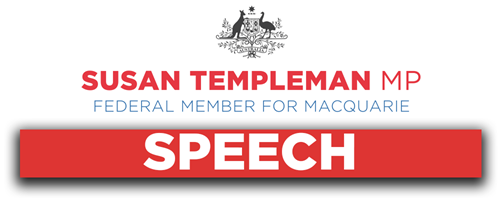
ENDOMETRIOSIS AWARENESS MONTH
I asked my daughter if she had any words she'd like me to share with the parliament today when I spoke about endometriosis. She texted me back this morning and said: 'Endometriosis is in the too-hard basket for most doctors. Not once has a doctor explained the state of my body in such a way that I could explain it back to you. I don't know how damaged I am, I just quietly live with pain. Often, it's been the discussions with my female friends where I've learned the most about my diagnosis. We sit together and compare the breadcrumbs of advice and information we've each received from our doctors. We compare surgeries and pain remedies, but even between us it's frowned upon to talk about the pain too much. We all have the pain, but how sad is that?' That really does sum up what women across my community have told me about their experiences of living with endometriosis and pelvic pain. As we mark Endometriosis Awareness Month, I want to say thank you to the sufferers, their families and the advocates who have not stopped pushing for greater support, awareness, education and treatment about endo.
Endo is a progressive chronic condition that starts at puberty and can continue beyond menopause. On average, it takes seven years to be diagnosed and treated for endometriosis. Women are told that heavy periods are normal and that the extreme pain they are enduring is just part of being a woman. This process has left many distressed, frustrated and, sadly, has caused some women to lose trust in our healthcare system. Research has also shown that one in nine Australian women suffer endo, while one in two experience pelvic pain and that half of those women don't discuss the symptoms with a doctor. That's why I'm proud to be part of a government that's taking action so that endometriosis sufferers don't have to tough it out alone.
At the start of this month, I welcomed the Assistant Minister for Health and Aged Care, Ged Kearney, to the Blue Mountains to mark International Women's Day with a health forum. We put gender bias in our healthcare system under the microscope. We were joined by women of all ages from across the electorate, including the Blue Mountains Women's Health & Resource Centre, to hear firsthand from women about their experiences accessing the support that they need for endo and many other conditions. I'm thankful to the many women who took the time to share their deeply personal stories, including on the debilitating and often silent impact of endometriosis. I know that being part of this government means we'll continue to work towards ensuring practical steps to combat medical misogyny and to better support women through their journey to diagnosis and treatment.
When it comes to battling endo, in its last budget the Albanese government included a $58.3 million package which covered a Medicare MRI item for investigating infertility related to endometriosis, the development of an endometriosis management plan and the establishment of 22 dedicated endometriosis and pelvic pain clinics across the country. I'm very pleased that we now have one of these officially open in Western Sydney. It opened just three weeks ago at the Rouse Hill Town Medical & Dental Centre. Last week, I caught up with Simon Taylor-Cross and Dr Sneha Wadhwani, who is the Evoca Women's Health clinical director at Rouse Hill, to talk more about the clinic and what they've seen in the first few weeks of operation. While the clinic is in its early days, they've welcomed women from right across Western Sydney, including from the hills of the Hawkesbury. They've all gone there to meet with a team of people with expertise and knowledge. They're seeing women at different stages of their journey, with some in their early teens through to women in their mid-50s. Some are women who've had disappointing medical experiences previously and some have had surgery, while for others it has been their first serious discussion about endo. I'm so grateful that they will get a good start to that journey.
What's key at these clinics is the multidisciplinary approach, with nurse practitioners, GPs specialising in endo and pelvic pain, physios and other allied health professionals all geared to a holistic response. I'm sure for many women this will have been the first time in their lives that someone has listened to them explain their experience with debilitating pain from endo and believed them.
It was heartening to hear the clinic's unwavering commitment to delivering sensitive, understanding and transparent care for patients from the beginning, with every single staff member having had specialist training by the Pelvic Pain Foundation Australia. I hope this will be a place where women get the best experience in this terrible condition.


